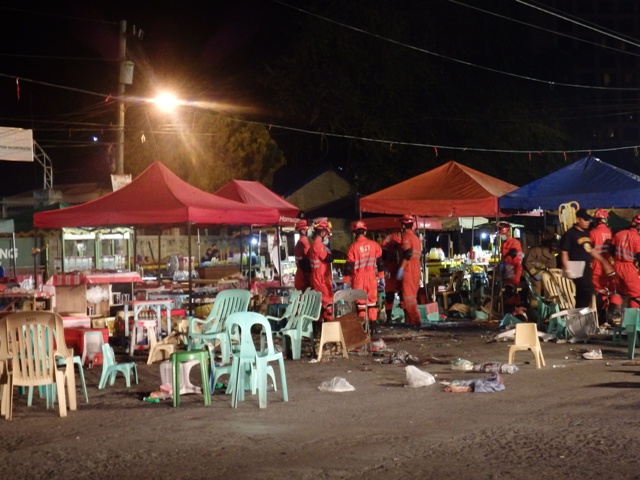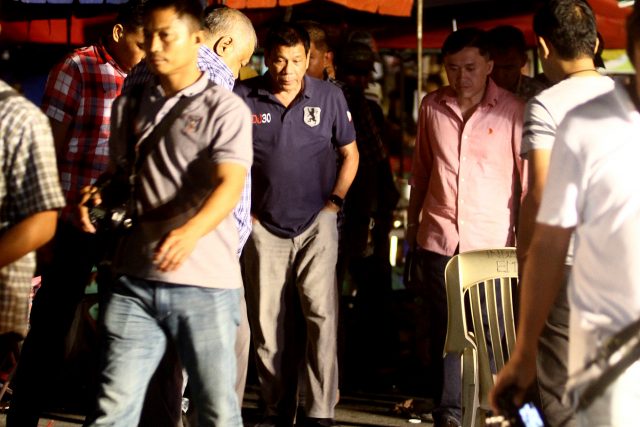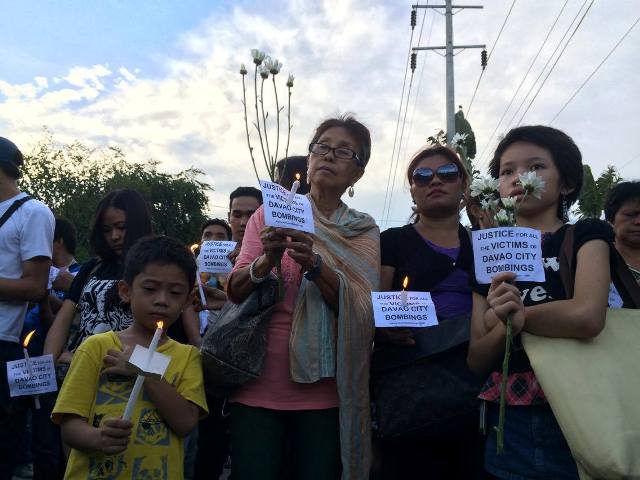DAVAO CITY (MindaNews/05 Sept) – Barely five hours before the blast at the night market along Roxas Avenue on Friday, President Rodrigo Duterte, the city’s mayor for 22 years, told reporters that “many people will kill but Davao is safe” and that he would resign “if you are mugged there or robbed there.”
Duterte spoke to the media after the inauguration of the Davao International Container Terminal in neighboring Panabo City just before sundown, before flying back to this city on a helicopter.
“I was very strict,” he said of his governance in Davao City. “Many people will kill.. but Davao is safe…. I challenge you, you walk (t)here in Davao, and if you are mugged there or robbed there, I will resign. I’m telling you publicly, go around, and if you are hurt, you lose a penny or your wallet, or held up, tell me. As long as it is the truth — I said we’ll limit ourselves to the truth – I will resign,” he said.
 The blast site in the early hours of Saturday, 3 September 2016, The explosion at 9:50 p.m. on Sept. 2 killed 14 and injured 70 others. MindaNews photo by Carolyn O. Arguillas
The blast site in the early hours of Saturday, 3 September 2016, The explosion at 9:50 p.m. on Sept. 2 killed 14 and injured 70 others. MindaNews photo by Carolyn O. Arguillas
Duterte was earlier asked about text messages that the Abu Sayyaf will attack one of the military camps in the region.
“Well, that should put us in a full alert now because of reprisals and that is not new to us. It could be anywhere, it could be in the whole of Mindanao,” he replied.
Barely five hours later, at around 9:50 p.m., an explosion ripped through the night market in Davao City, initially killing 10 (four more expired at the hospital). Seventy others were injured.
Friday’s blast was the first terrorist act against the two-month old Duterte administration, right in the home city of the President (he has been coming home every weekend since he assumed the post on June 30) and Director-General of the Philippine National Police, Ronald dela Rosa.
It is not clear in what part of the city Duterte was when the bomb exploded. But he met with security officials at the Davao City Police Office until the wee hours of Saturday and from there visited the blast site, the injured at the San Pedro hospital and Southern Philippines Medical Center, and condoled with grieving relatives at the Angel and Cosmopolitan funeral parlors.
Not the first time
“Is Davao still safe?” Duterte was asked at the blast site early Saturday morning. His reply: “Yes of course, Davao is safe. Wala man ditong criminals na. (There are no more criminals here). There is no criminality except terrorism.”
Duterte said this is not the first bombing incident in the city. “We are not new to this kind. It is always connected with the Abu Sayyaf or dito sa Central Mindanao… This is not the first time that Davao City has been sacrificed in the altar of violence.”
 President Rodrigo Duterte visits the blast site early Saturday morning. MindaNews photo
President Rodrigo Duterte visits the blast site early Saturday morning. MindaNews photo
Mindanao’s premiere city has suffered four major bomb attacks in the last 35 years: San Pedro Cathedral bombings on Easter Sunday, April 19, 1981 (17 killed, scores wounded), and on December 26, 1993 (seven killed, 150 injured); the waiting shed fronting the arrivals area of the old airport terminal on March 4, 2003 (22 killed, 155 wounded), and the passenger terminal at the international seaport in Davao City on April 2, 2003 (16 killed, 45 wounded).
All four bombings have remained unsolved.
Duterte was mayor in the 1993 and 2003 bombings and steered the city’s rise from what then Trade and Industry Secretary Mar Roxas referred to in the post-airport bombing as “doom and gloom.”
It cannot be denied that the bombing created a negative impact and the challenge was to restore confidence in the business sector, he said.
“This is a confidence issue. Before last week and this week, it’s the same but for the question mark on confidence of the business people. But we should not give up and not yield to the self-fulfilling prophecy of negativism and doom and gloom,” he said on March 8.
Roxas was confident the security challenge would be overcome and there should be nothing to worry about because “Mayor Duterte is the best person for that.”
Abu Sayyaf
A day after the airport bombing, the Abu Sayyaf’s Hamsiraji Sali claimed responsibility, apologized to the victims, said they did not intend to kill or hurt people yet added their main target was the airport but “our man was not able to enter the airport and placed the bomb outside.”
Sali’s claim, however, was quickly dismissed by authorities who announced on March 6 that the Moro Islamic Liberation Front (MILF), the subject of the “Buliok war” under the Arroyo administration, perpetrated the airport blast. Then Defense Secretary Angelo Reyes alleged that Montaser Sudang, an MILF “suicide bomber,” had strapped the bomb to his body. Sudang’s dead body was intact.
Cases of multiple murder and multiple frustrated murder were filed against MILF chair Salamat Hashim, MILF vice chair for military affairs Al Haj Murad Ebrahim and several others but four months later, the effects of their warrants of arrest were suspended following a petition for review at the Department of Justice that paved the way for the resumption of the peace talks. The complaints were dismissed a year later.
0n July 27, 2003, the Magdalo, a group of junior officers and enlisted personnel who broke away from the chain of command a day earlier, alleged in a statement that the airport and seaport bombings were perpetrated by a special operations group of the Armed Forces of the Philippines (AFP),” an allegation dismissed by the Arroyo administration. The group’s spokesperson was LTSG Antonio Trillanes, now Senator.
“Everybody is a suspect”
A day before the night market blast, Col. George Lalaquil, the Deputy Commander of Task Force Davao (TFD), assured Dabawenyos that there are no threats directed at the city from the Abu Sayyaf despite the President’s order to “destroy them.”
Lalaquil told the iSpeak Forum at City Hall, that they have not received reports from the intelligence community that the city is under threat.
The TFD was set up in April 2003 after the second bombing following the declaration of a “state of lawlessness” by then President Gloria Macapagal-Arroyo. It was supposed to have been a temporary set-up but had since become permanent.
 JUSTICE. Dabwenyos call for justice for Friday night’s blast and “all the victims of Davao City bombings” during the memorial mass Saturday, 3 September 2016. MindaNews photo by Antonio L. Colina IV
JUSTICE. Dabwenyos call for justice for Friday night’s blast and “all the victims of Davao City bombings” during the memorial mass Saturday, 3 September 2016. MindaNews photo by Antonio L. Colina IV
The Abu Sayyaf was reported to have owned up Friday night’s blast, but its spokesperson Muammar Askali alias Abu Ramie on Saturday was reported by the Philippine Daily Inquirer as saying it was not the Abu Sayyaf but an ally – the Daulat Ul Islamiya – that was responsible.
“They are doing this to sympathize (with) our group and we are sending a message to President Rodrigo Duterte that all the Daulat throughout the country is not afraid of him,” the report quoted Abu Ramie as saying.
Duterte last week deployed thousands of troops to Sulu to go after the Abu Sayyaf.
Early Saturday morning at the blast site, Duterte said “everybody is a suspect.”
“Of course, ASG (Abu Sayyaf Group) made a threat so we will look into that,” he said in an impromptu press conference aired live on ABS-CBN News Channel.
“Yes, there will be, I said, a reprisal of all of these things because of the Sulu incident. At least we know who made the threats,” he said.
“Keep calm”
Addressing Dabawenyos, Duterte said: “just keep calm… it’s seasonal in our city. We have suffered the most, (we’re) one of the most battered cities” in relation to “terrorism and all of these things, criminality.”
“Government is here with you. As much as humanly possible, we will protect everybody. We have very limited (number of) soldiers and policemen. So I suggest that the citizens also do their part by being vigilant.”
He ordered a lockdown in the city. “These are extraordinary times, and I suppose that I’m authorized to allow the security forces… of our country to do searches,” he said, as he urged the people to be “liberal enough to understand us because we are trying to cope up with a crisis now.”
“There is a crisis in this country involving drugs, extrajudicial killings..,” he said. It was at this point when he declared a state of lawlessness in the entire country, effective immediately.
State of lawlessness
“There seems to be the environment of lawlessness, lawless violence, so I might just declare a state of lawless violence in this country. It’s not martial law but I am inviting now the Armed Forces of the Philippines, the military and the police to run the country in accordance with my specifications,” the President said.
He said the declaration is effective immediately “until there is threat against the people and against the nation” and later said, “until such time I say that it’s safe for everybody.”
He allayed fears about the declaration. He said any action taken by the security forces would be “in furtherance to stop terrorism. And I am including drugs because of the so many killings unfairly attributed to the police, na parang handiwork daw ng pulis. We do not do that.” He noted that people involved in illegal drugs “really fight it out.”
Duterte reiterated he has a duty to protect the country. “I have this duty to keep intact the integrity of our nation. So, I’m declaring now a state of lawlessness. It is not martial law. It has nothing to do with suspension .. of the writ of habeas corpus….”
He said he would leave it to the police and the military “to do their thing.”
“I am not a policeman, I am not a military man. They can do what they really want to (do to) address the problem” and to find out who is responsible for the crime, the President said.
Earlier in the interview, when Duterte was asked if what happened was a failure of intelligence, he answered: “No, we … were ready for this. I said: ‘How could it be, there was this warning. And of course there’s also another one, the ‘Maute’ incident (in Marawi City, Lanao del Sur).. There has been a lot of violence committed lately by the terrorists. So we will treat this as a police matter about terrorism.” (Carolyn O. Arguillas / MindaNews)
